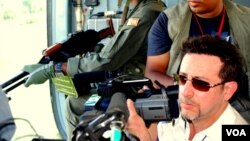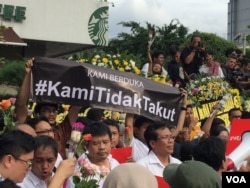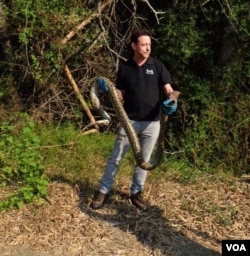Our Southeast Asia Bureau Chief, Steve Herman, today ends more than a quarter of a century of reporting in Asia heading to his new assignment as VOA’s Senior Diplomatic Correspondent, based at the State Department.
The late dictator of the Philippines, Ferdinand Marcos, whose rule was clouded in corruption, declared Asia’s ultimate challenge was to “discard the dry, meatless bone of mysticism and fatalism.”
The English journalist and Bombay native Rudyard Kipling, enamored by this mysticism, predicted decades prior to Marcos that the region would never “be civilized after the methods of the West” because “there is too much Asia and she is too old.”
In places as diverse as Bali and Bagram, I discovered there were many layers of histories. Sometimes they co-mingled and a combination yet echoes, while other conquerors expunged all that came before, the past only evident in what archeologists eventually uncover.
I have spent a little more than a quarter century here, a mere blip of the Asian eon. But my relatively scant experience has prompted me to conclude the dated guidance for Asian ideologues (usually simultaneously revered and condemned in their own countries) rings hollow and does not match contemporary realities.
Asia, I am convinced, is an archaic construct, a term appropriate for geography but certainly not sociology.
Covering nearly one-third of the Earth’s land area it includes countries in size from Russia to the Maldives, with 4.5 billion inhabitants speaking more than 2,000 languages and leading the world in religious diversity.
So what commonality binds these diverse lands, tongues and beliefs?
Frequently it is defined by what it is not.
Asian values
“Asian values,” we are told, bifurcate Eastern culture from the West, stressing communal approaches over individuality. The term, however, is used, too often by autocratic governments as an excuse to resist the democratic ideal.
At the risk of sounding stereotypical, I have observed family bonds are tighter and more pervasive than in Europe or North America. In many Asian countries, someone regarded as “brother” or “sister” may be, in reality a distant cousin while uncles with difficult-to-explain blood ties abound. Words exist to specify relationships left vaguely and inadequately in English. Nepalis, for example, are able to specifically introduce their mother’s younger sister’s husband as “sanno bubaa" (rather than the more vague "uncle.")
With these extensive relationships come responsibility. The family is to be nurtured and uniquely trusted amid suspicion of the motivations of those at large who are supposed to support society and lead the state.
Casual interactions from the Bosphorus to Borneo have taught me more about Asia than any of the region’s leaders’ summits filled with pomp and unkept annual promises.
Breaking paraki naan bread with an Afghan village chief led to more insight into certain geopolitical tensions than from interviews with tightly scripted government ministers.
Natural disasters
The most revealing characterizations of societies have come from experiencing them at their most stressed – amid civil war or natural disaster.
Frequently, the thought entered my mind of whether my compatriots would display such resilience, grit, ingenuity and flashes of humor among the magnitudes of misfortune.
Displaced Filipinos homeless after typhoons, Tamils trapped between dueling artillery units and North Koreans –- choosing their words very carefully -- in the pincer of Orwellian apparatus readily come to mind.
My homeland, to which I am now returning, has grown richer over the past century amid an influx now collectively called Asian-Americans. I now make a similar reverse exodus, regarding myself as an “American-Asian,” who will forever feel inexplicably rooted on both sides of the Pacific.









